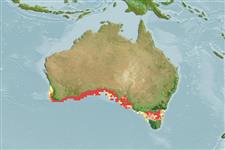>
Syngnathiformes (Pipefishes and seahorses) >
Syngnathidae (Pipefishes and seahorses) > Nerophinae
Etymology: Leptoichthys: Greek, leptos = thin + greek, ichthys = fish (Ref. 45335).
More on author: Kaup.
Environment: milieu / climate zone / depth range / distribution range
বাস্তুসংস্থান
সামুদ্রিক তলদেশ বিহারী. Temperate
Eastern Indian Ocean: endemic to southern Australia.
Length at first maturity / আকৃতি / ওজন / Age
Maturity: Lm 20.5, range 20 - 21 cm
Max length : 63.0 cm SL পুরুষ/ লিঙ্গ অনিধর্ারিত ; (Ref. 5316)
Found in moderate to shallow depths (Ref. 205). Inhabit seagrass (Ref. 75154). Largest known pipefish, may well reach 65 cm SL. Ovoviviparous (Ref. 205). The males carry the eggs in a brood pouch which is found under the tail (Ref. 205). Males may be brooding at 20-21 cm SL.
Male carries the eggs in a brood pouch (Ref. 205).
Dawson, C.E., 1985. Indo-Pacific pipefishes (Red Sea to the Americas). The Gulf Coast Research Laboratory Ocean Springs, Mississippi, USA. (Ref. 5316)
IUCN Red List Status (Ref. 130435: Version 2024-1)
Threat to humans
Harmless
Human uses
হাতিয়ার
Special reports
Download XML
ইন্টারনেট সুত্র
Estimates based on models
Preferred temperature (Ref.
123201): 15.2 - 18, mean 16.8 °C (based on 66 cells).
Phylogenetic diversity index (Ref.
82804): PD
50 = 1.0000 [Uniqueness, from 0.5 = low to 2.0 = high].
Bayesian length-weight: a=0.00093 (0.00036 - 0.00242), b=3.05 (2.83 - 3.27), in cm total length, based on LWR estimates for this (Sub)family-body shape (Ref.
93245).
ট্রফিক পর্যায়ে (Ref.
69278): 4.2 ±0.6 se; based on size and trophs of closest relatives
স্থিতিস্থাপক (Ref.
120179): মাধ্যম , সর্বনিম্ন প্রজন দ্বিগুনের সময় ১.৪-৪.৪ বৎসর (Preliminary K or Fecundity.).
Fishing Vulnerability (Ref.
59153): Moderate to high vulnerability (51 of 100).
